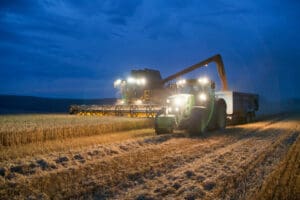Farming leaders and suppliers are warning that Chancellor Rachel Reeves’s inheritance tax on farming assets exceeding £1 million could undermine Britain’s food security, making the UK more dependent on foreign imports.
Senior business figures, including Nigel Murray, managing director of Booths supermarket, have voiced concerns that the tax changes could erode incentives for domestic food production, potentially leading to higher supermarket prices and reduced self-sufficiency.
Murray, whose supermarket sources 60% of its products from British farmers, stressed that while the impact may not be immediate, “over time there is a real risk that domestic food production could be eroded.” He noted that increased reliance on imports would bring challenges related to environmental impact, animal welfare standards, and costs.
The National Farmers Union (NFU) president, Tom Bradshaw, criticised the tax changes, warning that they may force family farms to sell off assets, threatening the next generation’s ability to sustain farming operations. Bradshaw expressed concern over long-term food security, adding that “every penny saved by the Chancellor comes directly from the next generation having to break up their family farm.”
ABF, the parent company of British Sugar, echoed these sentiments, with CEO George Weston calling the tax a blow to the farming community. He urged policymakers to place greater importance on food security and UK agricultural production. The NFU is pressing for discussions with Sir Keir Starmer and Rachel Reeves, with members of the Labour Party also encouraging dialogue to address farmers’ concerns.
Recent data highlights the vulnerability of UK cereal production to extreme weather, underscoring the importance of agricultural resilience. Previously, agricultural land enjoyed inheritance tax exemptions to promote generational continuity in farming. However, Reeves’s new rules, effective from April 2026, will impose a 20% tax on farming assets over £1 million, affecting asset-rich but cash-poor farms that may struggle to meet the tax liability without selling parts of their estates.
The Treasury maintains that the policy will impact only a minority of farms, but the NFU estimates the tax could affect up to 75% of British food production. The government argues that the new tax structure balances support for family farms with funding for critical public services.
In addition, Labour’s budget quietly closed a vehicle tax loophole for pickup trucks, impacting agricultural workers who depend on vehicles like the Ford Ranger for their operations. With tax bills on these vehicles expected to rise sharply, farmers like Jon Watt in Suffolk report adjusting their investment plans amid growing uncertainty over agricultural policy.
The policy changes have sparked a national debate on food security, with some industry leaders claiming that the tax risks driving closures among Britain’s estimated 140,000 family businesses. Family Business UK chairman Sir James Wates criticised the tax as “economic illiteracy,” cautioning that it could lead to business closures and job losses, while the Treasury argues that only a small number of businesses will be affected.
Read more:
Suppliers warn farming inheritance tax will jeopardise UK food security

